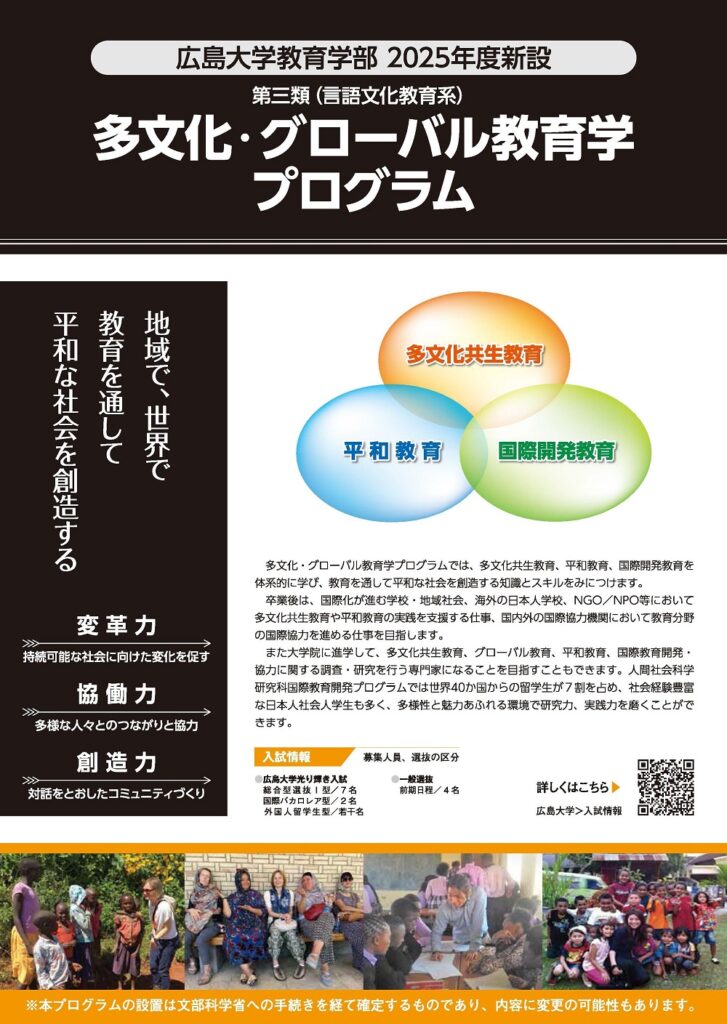概要 Overview
地域で、世界で、教育を通して平和な社会を創造する
多文化・グローバル教育学プログラムでは、多文化共生教育、平和教育、国際開発教育を体系的に学び、平和な社会の創造に向けて、
1)教育を通して多様な他者と共生できる社会を創造できる豊かな想像力と実践力
2)異なる価値観を持つ人々とグローバルに協働するための教育を実践する学際的な思考力と実践力
3)国際教育開発の分野で緊要な課題
の解決に貢献できる知識とスキル を身につけます。
授業では、課題探究型の授業を行い、国際バカロレア認定校、インターナショナルスクール、国際協力機関などでの観察実習やインターンシップも多数設定し、海外留学も強く推奨します。専門科目の中核は英語で行われるため、教養科目も工夫をすれば、英語のみで卒業ができ、英語を用いた実践力を向上させることができます。
卒業後は、国際化が進む学校・地域社会、海外の日本人学校、NGO/NPO 等において多文化共生教育や平和教育の実践を支援する仕事、国内外の国際協力機関(JICA、UNESCO、開発コンサルタントなど)において教育分野の国際協力を進める仕事を目指します。
また、大学院に進学して、多文化共生教育、グローバル教育、平和教育、国際教育開発・協力に関する調査・研究を行う専門家になることを目指すことができます。広島大学大学院人間社会科学研究科国際教育開発プログラムでは、世界 40 カ国からの留学生が7割を占め、社会経験豊富な日本人社会人学生も多く、多様性と魅力あふれる環境で研究力、実践力を磨くことができます。
Creating a peaceful society through education — locally and globally
In the Program in Multicultural and Global Education, students systematically study multicultural coexistence education, peace education, and international development education, aiming to contribute to the creation of a peaceful society by developing:
- Imagination and practical skills to build a society where people can live together in harmony with diverse others through education;
- Interdisciplinary thinking and practical skills to implement education that enables global collaboration among people with different values;
- The knowledge and skills necessary to address urgent issues in the field of international educational development.
After graduation, students aim to pursue careers that support the practice of multicultural coexistence education and peace education in increasingly internationalized schools and local communities, Japanese schools overseas, and NGOs/NPOs. They may also work in the field of international educational cooperation with organizations such as JICA, UNESCO, and development consulting firms, both in Japan and abroad.
Classes are inquiry-based, and students have many opportunities for fieldwork and internships at institutions such as International Baccalaureate (IB) schools, international schools, and international cooperation organizations. Studying abroad is also strongly encouraged. As core specialized courses are conducted in English, students who thoughtfully plan their coursework may complete their degree entirely in English, thereby enhancing their practical ability to use the language effectively.
Students may also choose to pursue graduate studies and become specialists engaged in research on multicultural coexistence education, global education, peace education, and international educational development and cooperation.
In the International Education Development Program of the Graduate School of Humanities and Social Sciences at Hiroshima University, approximately 70% of students are international, coming from over 40 countries. Many Japanese students also bring extensive professional experience. This diverse and vibrant environment provides an ideal setting for students to enhance both their research and practical skills.
広報ビデオ
リーフレット
